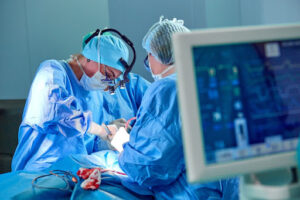
Bloodless heart surgery is performed to prevent blood loss and eliminate the need for blood transfusions and has been shown to provide an easier recovery process. It uses cutting-edge medical techniques that preserve the patient’s own blood. Also known as transfusion-free surgery, it can be a viable alternative for those who need traditional heart surgery but prefer a bloodless approach for personal or religious reasons. At Minimally Invasive and Bloodless Heart Surgery with Dr. Ciuffo, we’re here to take a closer look at what bloodless heart surgery is and what you can expect from the recovery process.
How Bloodless Heart Surgery Works
Transfusion-free surgery involves advanced techniques that prevent blood loss. In most cases, a surgeon will draw several units of blood, store it in a vessel, and infuse it back into the patient at the end of the procedure. The blood that they draw at the beginning usually gets replaced with a special salt solution, which dilutes the patient’s blood. This ensures that any blood that is lost has fewer red blood cells.
A surgeon may also collect bloodshed from bleeding during a case, wash it, and reinfuse it at the end of the procedure. Keep in mind that each bloodless heart surgery is unique and designed for each patient’s particular situation, needs, and preferences. The recovery process also deemed on a case-to-case basis.
Reasons to Undergo Bloodless Heart Surgery
There are a number of reasons patients choose bloodless heart surgery over traditional heart surgery, which involves blood loss and blood transfusions. It may make sense for those who are concerned about HIV, hepatitis, or other blood-borne diseases or have experienced complications from a previous blood transfusion. However, it is important to note that the concern for HIV and hepatitis has been mitigated nowadays because of the extensive routine testing of each unit of blood before it is available for transfusion. Bloodless heart surgery is also widely preferred among patients with specific religious beliefs who don’t want a donor blood transfusion.
Benefits of Transfusion-Free Surgery
The primary benefit of bloodless heart surgery is that it can save and reinfuse your own blood. It may also improve blood clots or stop bleeding. All of this usually leads to a shorter hospital stay, faster wound healing, and an overall quicker recovery process. It may also reduce the risk of blood transfusion complications. Time after time, studies show that avoiding blood transfusions results in less risk, greater safety, and an improved recovery process.
How to Prepare with Bloodless Heart Surgery
As with any surgical procedure, you must take certain steps before you undergo bloodless heart surgery. Your surgeon will ask you to increase your iron levels through supplements and dietary changes. You should take folic acid vitamins as well as these medications improve blood counts and temporarily stop using over-the-counter pain medications, such as ibuprofen and aspirin. In addition, it’s important that you refrain from smoking and drinking alcohol.
What to Expect After Bloodless Heart Surgery
Once your surgeon has completed bloodless heart surgery, you will be transferred to the recovery room immediately afterward so the care team can monitor your oxygen levels. Depending on your particular procedure and needs, the blood that was collected may be reinfused. You will also be given special fluids. In the event your oxygen levels are low, a hyperbaric oxygen chamber may be required.
While the recovery process varies by patient, it usually takes anywhere between six to eight weeks for your chest muscles and breastbone to properly heal. You may slowly but surely resume your daily routine. If you notice signs of infection, such as fever and chills, chest pain, cough, shortness of breath, lightheadedness, or weakness, contact your doctor right away.
Contact Us Today For A Bloodless Heart Surgery Evaluation
If you’re interested in bloodless heart surgery or have further questions about the procedure or recovery process, we encourage you to contact us today. visit our website to make an appointment, or call our office at (702) 333-7200 to speak with a team member. For additional information about our practice, please visit Nevada Heart and Vascular or University Medical Center.

